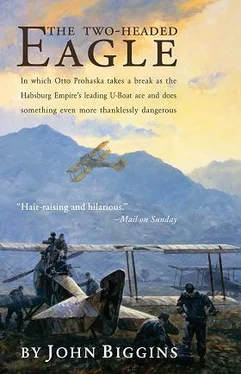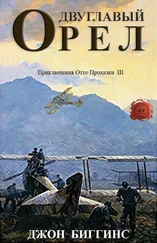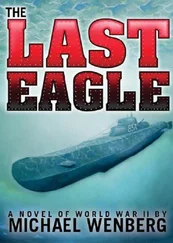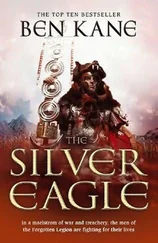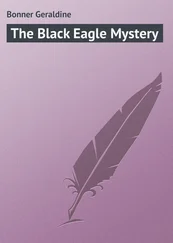“Hot this evening,” I ventured as a shell crashed near by, showering us with dust and debris.
He considered for a moment, exhaling the smoke with an expression of intense pleasure: it was months since we had been able to get cigarettes free of dried horse manure.
“Obediently report that it’s not too bad today, Herr Leutnant. They dropped a heavy right in among a relief party here last week: scraping them up with spoons we were.” I saw that he was not exaggerating: I had suddenly noticed a blackening human finger lying below the duckboards of the shelter. “No,” he went on, drawing on his cigarette, “most days it’s worse than this.”
“How do you stand it out here, week after week?”
He laughed at this. “Oh, we get by, Herr Leutnant, we get by somehow. All depends what you’re used to I suppose. I grew up in Ottakring, eight of us in one room and my dad out of work for three years, so I suppose this isn’t too bad really. The smell’s about the same, the food’s better and the meals are more regular if the ration parties don’t get blown up on the way; and there’s about the same amount of space to lie down in our dug-out. So overall it’s not too bad a life if you don’t think more than twenty seconds ahead. I’ve got a brother with the 11th Army in the Alps and he says it’s like a holiday camp up there—except that the Wellischers send a shell over every now and then and someone gets killed. He hopes the war’ll go on until he retires, he says.”
I found that our Italians were also realists about the war. Peasants from Basilicata with sad, honest brown faces and lugubrious black moustaches, they had the look of men who never expected life to be much fun—and who have not been disappointed in this expectation. I could barely understand what they were saying with my Venetian Austro-Italian. But from what I could grasp I gathered that they were less than totally filled with eroismo ardente. I asked one of them, a man rather older than the rest, where they were supposed to be going with this offensive of theirs. He replied that he had no idea and cared less; knew only that the signori ufficiali and the military police would take a poor view of them if they didn’t go forward when the whistles blew.
“Pah! La guerra—cosa di padroni!” he spat. His companions all spat as well and cursed the whims of the bosses, which had torn them from their families and smallholdings and sent them to fight for the Carso Plateau—“il Carso squallido,” as they called it, with a great deal of spitting and obscene gestures. Then they fell to reviling the politicians and journalists who had got them into this mess.
“Politics,” they said, “dirty business. Where we live Italy is an express train: it only stops around election time. All we see of it in between is the tax collector and the recruiting sergeant.”
“And what about your oppressed brothers in Trieste, groaning under the Austrian yoke? At least, that’s what the newspapers tell you.”
“We don’t read the newspapers,” replied the older man with great dignity, “because we are illiterate. But as for the Triestini, we couldn’t care a farthing. Would the Triestini come and rescue us when the landlords and the money lenders tip us off our land to beg? I tell you, Tenente, I care as much about fighting for Trieste as I do for New York.”
A younger soldier interrupted him. “No, Beppo, fair’s fair. Myself, I’d much rather fight for New York than for Trieste: I’ve got a brother living in Brooklyn and he sends us money orders.” Everyone laughed, and thought this a very apt remark.
“Well,” I asked, “if you are so fed up with the war why do you go on fighting? ”
They found this hugely amusing. One of them levelled a finger and traversed it around slowly, squinting along it as he did so:
“. . . Sette, otto, nove—PAFF! . . . diciasette, diciaotto, diciannove— PAFF!”
From this I gathered that, if nothing else, the Kingdom of Italy, self-proclaimed heir to ancient Rome, had borrowed from its ancestor a number of practices in the area of military discipline.
Some weeks after these events I happened to mention Oberleutnant Friml to Flik 19F’s Technical Officer Franz Meyerhofer, who was also a Sudetenlander.
“Oh, that thug?” he said, “ ‘the Death-Angel of the Isonzo Front,’ as the papers are calling him? Funny thing, but we were at school together in Eger. He was about six years below me, but my brother was in the same class.”
“What was he like then? ”
“Rather a weed, my brother said: always being picked on, and wouldn’t go skating and playing football like the rest. He left school after his Matura and became a life-insurance salesman. It’s strange really what the war brings out in people.”
I happened to meet Friml again on the last day of 1916, at a New Year’s party in Vienna. He had recently won the Maria Theresa, but he was clearly in a very bad way: nerves completely gone to pieces. He was killed a few weeks after he got back to the trenches: by snake bite, I understand. It was a very odd business I remember, from the reports that I heard of the enquiry. He took his boots off and got into the bunk in his dug-out after a raid, and was bitten by a horn-nosed viper hiding under the blankets. His men said that the snake must have been hibernating there, but they called in a snake expert who said that horn-nosed vipers don’t hibernate.
So they changed tack and said that it must have hidden there from fright during a bombardment. In which case, said the expert, it must have been a very frightened reptile indeed, and very disorientated, because horn-nosed vipers are unknown north of the Dinara Mountains, about three hundred kilometres further south. The military procurators tried pinning it on a Croat soldier in Friml’s storm-company, but the rest of the men closed ranks and they could never get enough evidence for a charge of murder. I suppose that it was better in a way that he died: I would have hated to think of him back in civilian clothes, reduced to selling life insurance on the streets of Eger with his spring-loaded cosh in one hand and a briefcase in the other. The “trincera-crazies,” the Italians called them. Europe’s tragedy was not the Oberleutnant Frimls who died, I think; it was the ones who came back.
We arrived back at Fliegerfeld Caprovizza early next morning to find that we had been posted missing. Observation posts on the ridge of Debeli Vrh had seen a Lloyd two-seater hit by anti-aircraft fire over Monfalcone and had watched it come down in no man’s land on the Svinjak. I also discovered to my fury that my commanding officer Hauptmann Kraliczek had gone a step further and reported us both dead in action, in consequence of which a telegram had already been sent to my wife in Vienna. So it was necessary for me to leap straight away on to a bicycle, still in my tattered flying overalls, bone-weary and covered in trench grime, and rush to Haidenschaft telegraph office to send a telegram telling her that I was all right. Then it was back to Caprovizza, muttering curses against my commanding officer, and to bed for a few hours’ much-needed sleep, my head still ringing from shellbursts and my lungs aching from the after-effects of gas.
I was woken up by my batman Petrescu a few hours later, still feeling rather seedy. A staff officer was waiting to see me outside my tent. I came out, unshaven and blinking in the sunlight, and had my hand warmly shaken by an Oberst, the Air Liaison Officer from 5th Army Headquarters, who had motored down from Marburg to meet me. He congratulated me on my extraordinary feat in bringing down the airship Citta di Piacenza the previous day, and requested that I should please to present myself with my pilot in Haidenschaft that afternoon to be introduced to the Heir-Apparent, the young Archduke Karl, who was visiting the troops in the area and had expressed the wish to meet us. I mentioned the missing wireless set, and obediently reported that we had managed to retrieve some parts of it the previous day even if we had lost an aeroplane and almost lost our own lives in doing so. He seemed surprised.
Читать дальше
